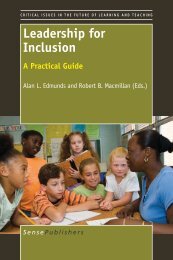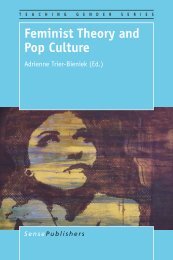TRANSCENDING DISCIPLINARY BOUNDARIESanymore to program, I know that. The real duty behind software development isn’tcode. Code equals a small percentage. Really: it’s sitting down <strong>and</strong> really thinkingit out. ... Now, I don’t think about program in terms of lines of code, how manyfunctions. Problems don’t seem as big as they used to, they’re simplified. [Now,]I’d take a project, break it down to its core elements, <strong>and</strong> really focus on ... [w]hatis the underlying problem, what underlying job needs to get done? Break down theproblem into pieces, each piece has its own duty or task, functionality. Instead ofa big, round ball, [it becomes] things more like blocks.Retrospective indications of defensiveness: anonymous end-of-term course evaluations.In the case study course, retrospective projection onto the teacher <strong>and</strong>course structure of all responsibility for difficulty in class is interpreted as evidenceof defensiveness, for example, this student’s comments:(S_lA1): I think this class was much more difficult than it had to be. ... My mainconcern was trying to interpret what was being asked, instead of <strong>learning</strong> thematerial. A separate point – we spent 2 periods going over the [KWIC indexprogram] – Why? Why the line by line analysis of the ... program? This has littlevalue – except to confuse <strong>and</strong> bewilder the class.In-process feedback: indications of anxiety. Almost all feedback data collected atsemester’s end (representing after-the-fact reportage) satisfies exactly one of thedefining conditions delineated in the previous section. However, for most of thegroup project, qualitative data logged in the midst of students’ actual process doesnot satisfy either definition. It does consistently display a heightened level ofaffect, indeed anxiety, even among students whose projects later turned out well.Consider student entries from week 1 of the project:(S_m201): ... It seems to me that we were not getting anywhere very quickly <strong>and</strong>this undertaking was larger than I previously had thought. What seems like sucha straightforward assignment has become very complex ...(S_m202): ... I’m a very calm <strong>and</strong> balanced person, <strong>and</strong> never really get stressedout about anything homework-wise because of the timeline I usually follow whenI work. This project is already starting to stress me out because of the seeming lackof progress that we’ve gotten through so far. It seemed to me to be a fairlystraightforward assignment at first, especially given the examples of the circles<strong>and</strong> the KWIC index, <strong>and</strong> I had hoped to hammer out a good outline to the[documents] within the first two sessions. We’re nowhere near that yet. ... It feelslike we’re getting nothing done, <strong>and</strong> right now I don’t necessarily know where towork next on my own.These entries confirm the relevance of Segal’s analysis; students are experiencing(effects of) explicitness: the confusion that follows exposure to – but precedes<strong>learning</strong> (or not) of – existentially unfamiliar material. Distinctions that retrospectivelyidentify reflective <strong>and</strong> defensive responses do not apply. Analyzing inprocessdata to distinguish between the two response types poses much more37
SCHWARTZMANchallenge than interpreting feedback given retrospectively, a difference relevant tothe TC community concern with underst<strong>and</strong>ing <strong>and</strong> supporting student encounterswith challenging material.These students’ group produced an extremely strong project, <strong>and</strong> their respectiveindividual practices were significantly transformed by completing that project;indicating retrospectively that they responded reflectively. Their journal entriesduring the project indicate heightened levels of anxiety. Note, therefore, that inprocessanxiety does not necessarily equal defensiveness, <strong>and</strong> reflectiveness neitherequals contemplation nor means diminished affect.38THEORETICAL FOUNDATION: EVALUATING THE CANDIDATEIn this section, the proposed c<strong>and</strong>idate theoretical foundation is considered in lightof the roles a theoretical foundation should play: illuminating coherence <strong>and</strong>meaning in the body of existing literature, providing an organizing principle outof which the field can continue to emerge in a coherent way, <strong>and</strong> defining anexplanatory theory for practice.Illuminating Internal Coherence of Existing TC LiteratureReal <strong>learning</strong> requires stepping into the unknown, which initiates a rupture inknowing. The interval of difficulty that follows exposure to existentially unfamiliar,educationally critical material can be understood as a response to that rupture. It isfilled with confusion <strong>and</strong> uncertainty, even when it is also filled with <strong>learning</strong>(Brown et alia 2001). In the language of Heidegger’s dynamic of rupture, theinterval comprises a form of (response to) explicitness; that is, reflectiveness ordefensiveness. By definition, all TC scholarship is concerned (directly or indirectly)with encountering the unknown. In offering meaningful explanation for the intervalof confusion <strong>and</strong> uncertainty that is inescapably engendered by such encounters,a reflectiveness / defensiveness framework illuminates connections <strong>and</strong> an elementof commonality among all TC scholarship.Informing Future Theoretical <strong>and</strong> Application DevelopmentOwing to its relevance for all TC scholarship, a reflectiveness/defensivenessconceptual framework (comprising the proposed theoretical foundation) formsinfrastructure on which developing TC theory can be anchored. It also enablesissues of <strong>learning</strong> discipline-specific scholarship to be brought more sharply intofocus, clarifying relevant questions. The consequences of reflectiveness or defensiveness,<strong>learning</strong> – or not, provide an embedding context to contain, shape, <strong>and</strong>evaluate both developing theory <strong>and</strong> application.Defining an Explanatory TheoryThe reflectiveness/defensiveness conceptual framework, together with elements ofits explication <strong>and</strong> of its generative phenomenon, form an explanatory theory forstudent experience, as described in the next section.
- Page 1 and 2:
EDUCATIONAL FUTURES: RETHINKING THE
- Page 3 and 4:
EDUCATIONAL FUTURESRETHINKING THEOR
- Page 5 and 6:
A C.I.P. record for this book is av
- Page 7 and 8:
TABLE OF CONTENTS10. Threshold Conc
- Page 9 and 10:
Pax Intrantibus Salus Exeuntibus. L
- Page 11 and 12:
LAND ET ALstudents experience diffi
- Page 13 and 14:
LAND ET ALModePreliminalLiminalPost
- Page 15 and 16:
LAND ET AL(Barker, 1991, p.184). Th
- Page 17 and 18:
LAND ET ALvariations arising from t
- Page 19 and 20:
LAND ET ALform of a model of concep
- Page 21 and 22:
LAND ET ALQuestions of intersection
- Page 24 and 25:
EDITORS’ PREFACEstudents bring to
- Page 26 and 27:
EDITORS’ PREFACEconcepts in the f
- Page 28 and 29:
EDITORS’ PREFACEIn the final illu
- Page 30 and 31:
EDITORS’ PREFACEhence becomes a n
- Page 32 and 33:
EDITORS’ PREFACElearning. This th
- Page 34 and 35: EDITORS’ PREFACEa lens or ‘way
- Page 36 and 37: EDITORS’ PREFACEHence learning is
- Page 38 and 39: EDITORS’ PREFACEthe Communitas, w
- Page 40 and 41: EDITORS’ PREFACEBuilding on these
- Page 42 and 43: EDITORS’ PREFACECousin, G. (2009)
- Page 44 and 45: DAVID PERKINSFOREWORDEntrance…and
- Page 46: FOREWORDMeyer, J.H.F., Land, R. & D
- Page 50 and 51: JULIE A. TIMMERMANS1. CHANGING OUR
- Page 52 and 53: CHANGING OUR MINDSKegan’s (1982)
- Page 54 and 55: CHANGING OUR MINDSKegan describes e
- Page 56 and 57: CHANGING OUR MINDSIn fact, Kegan an
- Page 58 and 59: CHANGING OUR MINDSat the epistemolo
- Page 60 and 61: CHANGING OUR MINDSMight a learner r
- Page 62 and 63: CHANGING OUR MINDSreveals an additi
- Page 64 and 65: CHANGING OUR MINDSBendixen, L. D.,
- Page 66: CHANGING OUR MINDSSibbett, C., & Th
- Page 69 and 70: SCHWARTZMANScholarship in liminalit
- Page 71 and 72: SCHWARTZMANTC: the entityThe term T
- Page 73 and 74: SCHWARTZMANA resource for teaching
- Page 75 and 76: SCHWARTZMANunprecedented to attract
- Page 77 and 78: SCHWARTZMANspectrum of scholarship
- Page 79 and 80: SCHWARTZMANrupture and phenomenolog
- Page 81 and 82: SCHWARTZMANfield(s) of one’s cons
- Page 83: SCHWARTZMAN36DATA: PARTICULARS GIVI
- Page 87 and 88: SCHWARTZMANStrategies for Teaching:
- Page 89 and 90: SCHWARTZMANThey are redefined here
- Page 91: SCHWARTZMANLoder, J. (1981). The tr




